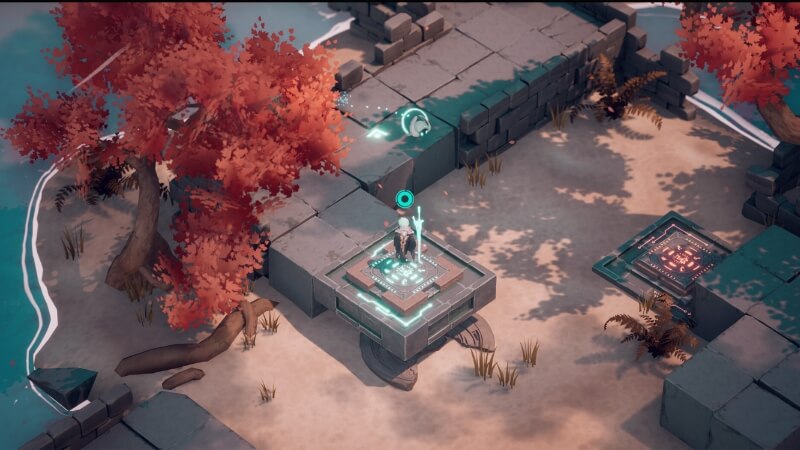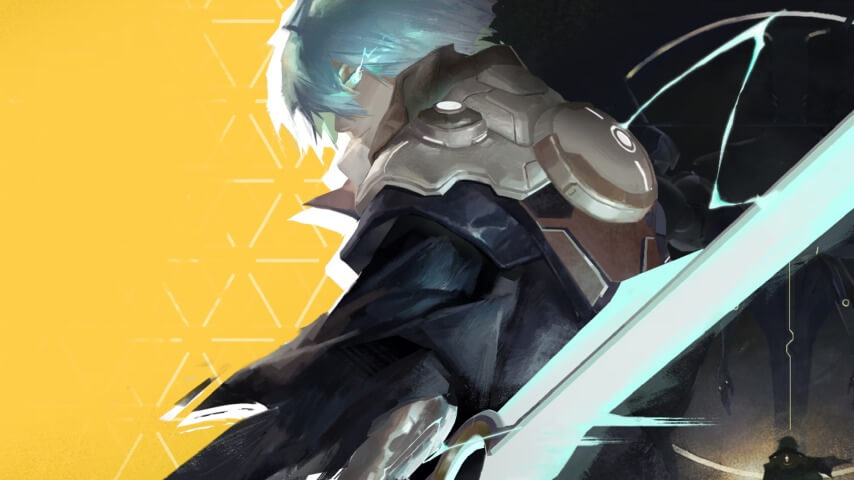I see advertisements for AI products every time I take the train in Chicago. The latest campaign is for Friend, a wearable tech AI product which promises to be just what it is called. Patrons of the CTA have written on, scratched out, removed, and torn up the ad so thoroughly that it’s basically unreadable. Messages scrawled on the ads encourages passersby to look up AI psychosis or simply to not trust what these companies are selling. Similar ads received the same response in New York, to the extent that the whole situation has its own section on Friend’s Wikipedia entry.
Retrace the Light, a new action-adventure RPG from the Chinese studio Xiaming Game, places you as, well, exactly the kind of thing “Friend” is selling. You are the Decem, the last of 10 programs called “Enforcers.” These programs battle their way through the unconscious worlds of therapy patients. They are aspects of Primus, a massive AI model which has eliminated war, monitors all communication, and stands behind every single human government. This story puts Retrace the Light at a fascinating intersection between the science fiction of the past and of the future. It draws on every cliché from stories about robots imaginable. Yet, it is also engaged with our ongoing ideal of nearly every aspect of human life being changed by tech companies that sprawl across our communities and ecosystems, whether irl or digital. Sadly, the game’s generic tone makes it merely interesting, rather than impactful.
Before the last five or six years, AI meant something different in popular culture. You might think of the android Data from Star Trek: The Next Generation, the droids in Star Wars, the replicants in Blade Runner, or any other of hundreds of examples. What the vast majority of these fictional depictions share is, well, humanity. In every one of these examples, the AIs stand in for an aspect of humankind. In the Next Generation episode “Measure of a Man,” Data’s humanity is literally put on trial. Captain Picard, acting in his crew mate’s defense, realizes that more than Data’s freedom is at stake. If the trial “proves” Data to be a mere machine, there would be no reason to stop the government from making more beings like him and enslaving them. Whether Date experiences a “human-like” subjectivity is irrelevant. He has a will. Others can subjugate that will. His experience of oppression proves him to be a thinking being.
While Data himself is not so much a metaphor for marginalization as he is for neurological difference, Picard’s logic unveils the concerns of science fiction from well before and after “Measure of a Man” aired. Blade Runner‘s replicants and Star Wars’ droids are both enslaved underclasses. Nier: Automata‘s androids are foot soldiers in an endless war beyond their understanding. Artificial intelligence has stood in for oppression as long as they have been a part of science fiction.

As machine learning models (marketed as AI) have popped into popular culture, it is easy to think of the opposite side of that coin: Skynet or the agents in The Matrix, created consciousness as inhuman surveillance network. For now, what marketing and shorthand call AI are tools, shaped entirely through human hands. They don’t resemble Data’s thinking, living being, so much as they resemble the Enterprise’s computer. Setting aside the grandiose and paranoid claims of “AI luminaries,” the dream of machine learning integration into workflows and apps is one of a thinking, but not living, machine. Data talks to the computer, and it calculates, but it cannot disobey.
Retrace the Light is not the first work to deal explicitly with both machine learning in the real world and generations of “robots as oppression” metaphors, yet these two threads feel especially interwoven within it. It deals with mass layoffs due to new technologies, high pressure development of new AI models, relationships between governments and AI regulation. The game has a ripped-from-the-headlines quality, though it is set over a thousand years from 2025. Yet it also trades in the sci-fi clichés I have already enumerated. It is obvious from Retrace the Light’s opening moments that Primus is up to something. The name “Enforcers” is a menacing one. Decem is not allowed to talk with his patients directly. He and his fellow Enforcers further Primus’ cause, yet it also uses them.
To start, this is generic, though fertile ground. I don’t mean to say that Retrace the Light is ludonarratively dissonant. Fighting inner demons has been a metaphor of mental health since eons before psychoanalysis was a gleam in Freud’s eye. I mean to say it is shallow. Decem’s interactions with his patients are diffuse and insubstantial. He solves puzzles and fights enemies in encounters that feel totally separate from the drama emerging around him. It’s not thoughtless, but it is uninspired. Retrace the Light, through a combination of deliberate design and timing, places itself at the heart of our changing world, but outside of a few gimmicks, it plays like any other isometric action adventure out there.
The work of fiction Retrace the Light feels most directly in conversation with is Tron. They share a central control program, which dominates and controls the lives of smaller programs. They depict computers as a psychedelic world where both literal and metaphorical combat is waged. However, Tron is about a kind of spontaneous creation: the thing you’ve made has taken on a life of its own. In it, artificial intelligence is an act of almost un-deliberateness. The creation of an accounting program or a anti-virus suite creates creatures totally unknown to the program’s creators. The programs of Tron are much like human beings in this way. They have beliefs, ideas, and dreams of how the world outside them works, yet they cannot know it. These existential themes are not new. If Frankenstein is the first science fiction novel, then one could argue the monster is one of the first robots. Tron: Legacy smuggles this religious character into thin subtext, charting instead a path of fathers and sons. (How Ares handles this I couldn’t say; I am existentially opposed to any film starring Jared Leto). At the core of the original Tron is an existential story about coming to know your creator. It remains a misfit classic, because of this human element.
It is that human touch which Retrace the Light struggles with. It arranges its characters and its level design in simple, smart, and all-too-preordained ways. It signals its twists with such loudness that its occasional subtleties barely register. It’s cleaner than something like Tron and topical in a way Star Trek or Blade Runner can’t be. All those tap into something far more real, though, because they are willing to ground themselves in a fuzzy, animal life which is all too distant here. When I think of the Friend billboards scattered across my home city, I think of simple anger. That is something too human for Retrace the Light to capture.
Retrace the Light was developed by Xiaming Game and published by Xiaming Game and Glintforge. It is available for PC.

 Keep scrolling for more great stories.
Keep scrolling for more great stories.

